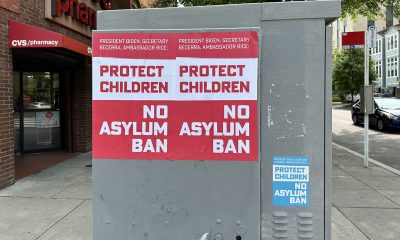National
Bi-national gay couples file lawsuit targeting DOMA
Case follows administration’s refusal to hold green cards in abeyance

A new lawsuit was filed Monday challenging the constitutionality of the Defense of Marriage Act — this time on the grounds that it discriminates against married bi-national same-sex couples seeking to remain together in the United States.
Immigration Equality, an LGBT advocacy group, filed the case in the U.S. District Court for the Eastern District of New York on behalf of five gay couples. The law firm Paul, Weiss, Rifkind, Wharton & Garrison LLP joined the organization in filing the lawsuit.
The lawsuit, known as Blesch v. Holder, targets the inability of these spouses to secure residency in the United States through the marriage-based green card application process.
Americans in opposite-sex marriages can sponsor their foreign spouses for residency in the United States, but that option isn’t available to same-sex couples because of DOMA. These couples are at risk of separation if the foreign national is undocumented or if a temporary visa obtained for work or some other purposes expires.
“Because of DOMA, the federal government does not recognize the marriages of same-sex couples and, therefore, denies them the immigration rights afforded to other married couples,” the complaint states. “As a result, these couples live their lives at constant risk of separation.”
The five couples represented in the lawsuit are Edwin Blesch and his South African spouse, Tim Smulian, who reside in Orient, N.Y.; Frances Herbert and her Japanese-born spouse, Takako Ueda, who reside in Dummerston, Vt.; Heather Morgan and her Spanish-born spouse, Maria del Mar Verdugo, who live in New York City; Santiago Ortiz and his Venezuelan-born spouse, Pablo Garcia, who live in Elmhurst, N.Y.; and Kelli Ryan and her British-born spouse, Lucy Truman, who reside in Sandy Hook, Conn.
The complaint details the stories of each of the couples involved in the lawsuit. For Blesch and Smulian, the complaint notes that Blesch has been living with HIV since 1987. For 11 years, the couple spent six months in the United States and six month abroad to stay together.
However, according to the complaint, complications from HIV therapy as well as other health problems have begun taking a toll on Blesch’s health. As a result, he’s no longer able to spend six months in South Africa because it would be too far from his doctors. The couple has been spending much of their time in Canada, but Blesch’s Medicare doesn’t cover him in that country and he’s forced to return twice to the United States for care.
“Tim, heartbroken, could not accompany Edwin to his doctors (as he always does), fearful he would be denied entry to the United States during those six-month periods,” the lawsuit states.
Immigration Equality’s lawsuit is one of about a dozen pending lawsuits challenging DOMA. This week, the First Circuit Court of Appeals was set to hear oral arguments for two cases, marking the first time an appellate court has held a hearing on DOMA.
Rachel Tiven, executive director of Immigration Equality, said her lawsuit was a necessary addition to existing cases because no pending lawsuit focuses on bi-national couples.
“We worked closely in partnership with GLAD, Lambda, ACLU to determine what would make sense to protect the rights of people for whom their DOMA problem is immigration benefits, and really came to the conclusion that the time is now,” Tiven said.
Lavi Soloway, co-founder of Stop the Deportations and an immigration attorney at Masliah & Soloway, said the lawsuit will help draw attention to the plight of gay bi-national couples. He has no involvement with the lawsuit.
Still, Soloway expressed skepticism that the case would have any impact on the law because he thinks other DOMA lawsuits will reach the Supreme Court sooner.
“Certainly, bi-national couples experience Section 3 of DOMA in a way that is hard to compare to any other situation, but the reality is that this lawsuit will move through the federal judicial system for years and is unlikely to produce any immediate change,” Soloway said.
But the Immigration Equality case isn’t the first lawsuit to challenge DOMA on the basis that it’s unfair to bi-national same-sex couples. In September, a federal judge threw out a case filed by Handi Lui, an Indonesian native who was denied a marriage-based green card application.
Tiven said her organization’s lawsuit will be more successful than other immigration-related DOMA cases because it was filed in a different circuit that is governed by different case law.
“We filed in the Second Circuit because we believe that a DOMA challenge based on immigration need will succeed here and because all of the states in the second circuit are marriage equality states,” Tiven said.
The Obama administration announced last year it would no longer defend DOMA in court, and since then — following a vote of the Bipartisan Legal Advisory Group — the House general counsel has taken up defense of the law.
In the Immigration Equality case, the Justice Department is similarly expected to decline to defend DOMA, and the attorneys of House Speaker John Boehner are expected to come to the defense of the anti-gay law.
Immigration Equality has called on the Obama administration to hold the marriage-based green cards of bi-national same-sex couples in abeyance — so they cannot be denied — until Congress or the courts act to repeal DOMA. Each time the organization has made the call, the administration has said it would continue to enforce DOMA as long as it remains on the books.
One of the couples involved in the lawsuit, Ryan and Truman, have asked the administration to make this change. In November, Sen. Richard Blumenthal (D-Conn.) wrote the Department of Homeland Security to ask officials to place on hold the couple’s green card application.
According to The Advocate, LGBT groups met with White House officials to January to discuss the possibility of putting the green cards in abeyance. But administration officials reportedly told LGBT rights supporters such action wouldn’t be taken.Case
Tiven said Immigration Equality filed the lawsuit because the administration’s decision left the organization no other option.
“We’ve been really working … for a year now to ask them to hold the green card applications for couples who are affected by DOMA and, after a lot of back and forth, they ultimately said ‘no,'” Tiven said. “So we really were left with no choice but to sue.”
Soloway said the administration has no reason not to take action to place the green cards in abeyance to protect bi-national same-sex couples.
“It is not a legally required position, it is a political choice,” Soloway said. “If they want to protect all LGBT families, then they could craft policy that would secure married bi-national couples in the interim period.”
While the administration hasn’t taken action to hold the marriage-based green card applications in abeyance, it has said it would include bi-national same-sex couples as part of an effort to take low priority cases out of the deportation pipeline by granting them prosecutorial discretion.
The criteria for being taken out of the deportation pipeline include a person’s ties and contributions to the community and family relationships, and administration officials have said these criteria are inclusive of LGBT families and same-sex couples.
But Soloway said these protections for bi-national same-sex couples are insufficient because, beyond speaking to media, the administration has never explicitly said this change covers LGBT families.
“We should not be fooled,” Soloway said. “There’s no expressed protection being provided under the prosecutorial discretion policy to lesbian and gay bi-national couples. It has worked in certain cases, but it’s far from consistent and it depends on individual ICE prosecutors understanding how to apply the guidelines.”
Moreover, Tiven said none of the couples in the lawsuit have received notification they would be taken out of the deportation pipeline as a result of this initiative.
According to Immigration Equality, Blesch and Smulian have one year of deferred action for a deportation hearing, while Herbert and Takako are applying for such action. Ryan and Truman as well as Morgan and del Mar Verdugo are able to stay together in the United States because of work visas.
“It doesn’t let them make any advance plans,” Tiven said. “In the [Morgan and del Mar Verdugo’s] case, they talked about having children, but have postponed that because they just don’t know what could happen.”
National
Same-sex couples vulnerable to adverse effects of climate change
Williams Institute report based on Census, federal agencies

A new report by the Williams Institute at the UCLA School of Law finds that same-sex couples are at greater risk of experiencing the adverse effects of climate change compared to different-sex couples.
LGBTQ people in same-sex couple households disproportionately live in coastal areas and cities and areas with poorer infrastructure and less access to resources, making them more vulnerable to climate hazards.
Using U.S. Census data and climate risk assessment data from NASA and the Federal Emergency Management Agency, researchers conducted a geographic analysis to assess the climate risk impacting same-sex couples. NASA’s risk assessment focuses on changes to meteorological patterns, infrastructure and built environment, and the presence of at-risk populations. FEMA’s assessment focuses on changes in the occurrence of severe weather events, accounting for at-risk populations, the availability of services, and access to resources.
Results show counties with a higher proportion of same-sex couples are, on average, at increased risk from environmental, infrastructure, and social vulnerabilities due to climate change.
“Given the disparate impact of climate change on LGBTQ populations, climate change policies, including disaster preparedness, response, and recovery plans, must address the specific needs and vulnerabilities facing LGBTQ people,” said study co-author Ari Shaw, senior fellow and director of international programs at the Williams Institute. “Policies should focus on mitigating discriminatory housing and urban development practices, making shelters safe spaces for LGBT people, and ensuring that relief aid reaches displaced LGBTQ individuals and families.”
“Factors underlying the geographic vulnerability are crucial to understanding why same-sex couples are threatened by climate change and whether the findings in our study apply to the broader LGBTQ population,” said study co-author Lindsay Mahowald, research data analyst at the Williams Institute. “More research is needed to examine how disparities in housing, employment, and health care among LGBT people compound the geographic vulnerabilities to climate change.”
Read the report
Federal Government
Lambda Legal praises Biden-Harris administration’s finalized Title IX regulations
New rules to take effect Aug. 1

The Biden-Harris administration’s revised Title IX policy “protects LGBTQ+ students from discrimination and other abuse,” Lambda Legal said in a statement praising the U.S. Department of Education’s issuance of the final rule on Friday.
Slated to take effect on Aug. 1, the new regulations constitute an expansion of the 1972 Title IX civil rights law, which prohibits sex-based discrimination in education programs that receive federal funding.
Pursuant to the U.S. Supreme Court’s ruling in the landmark 2020 Bostock v. Clayton County case, the department’s revised policy clarifies that discrimination on the basis of sexual orientation and gender identity constitutes sex-based discrimination as defined under the law.
“These regulations make it crystal clear that everyone can access schools that are safe, welcoming and that respect their rights,” Education Secretary Miguel Cardona said during a call with reporters on Thursday.
While the new rule does not provide guidance on whether schools must allow transgender students to play on sports teams corresponding with their gender identity to comply with Title IX, the question is addressed in a separate rule proposed by the agency in April.
The administration’s new policy also reverses some Trump-era Title IX rules governing how schools must respond to reports of sexual harassment and sexual assault, which were widely seen as imbalanced in favor of the accused.
Jennifer Klein, the director of the White House Gender Policy Council, said during Thursday’s call that the department sought to strike a balance with respect to these issues, “reaffirming our longstanding commitment to fundamental fairness.”
“We applaud the Biden administration’s action to rescind the legally unsound, cruel, and dangerous sexual harassment and assault rule of the previous administration,” Lambda Legal Nonbinary and Transgender Rights Project Director Sasha Buchert said in the group’s statement on Friday.
“Today’s rule instead appropriately underscores that Title IX’s civil rights protections clearly cover LGBTQ+ students, as well as survivors and pregnant and parenting students across race and gender identity,” she said. “Schools must be places where students can learn and thrive free of harassment, discrimination, and other abuse.”
Michigan
Mich. Democrats spar over LGBTQ-inclusive hate crimes law
Lawmakers disagree on just what kind of statute to pass

Michigan could soon become the latest state to pass an LGBTQ-inclusive hate crime law, but the state’s Democratic lawmakers disagree on just what kind of law they should pass.
Currently, Michigan’s Ethnic Intimidation Act only offers limited protections to victims of crime motivated by their “race, color, religion, gender, or national origin.” Bills proposed by Democratic lawmakers expand the list to include “actual or perceived race, color, religion, gender, sexual orientation, gender identity or expression, ethnicity, physical or mental disability, age, national origin, or association or affiliation with any such individuals.”
Democratic Gov. Gretchen Whitmer and Attorney General Dana Nessel have both advocated for a hate crime law, but house and senate Democrats have each passed different hate crimes packages, and Nessel has blasted both as being too weak.
Under the house proposal that passed last year (House Bill 4474), a first offense would be punishable with a $2,000 fine, up to two years in prison, or both. Penalties double for a second offense, and if a gun or other dangerous weapons is involved, the maximum penalty is six years in prison and a fine of $7,500.
But that proposal stalled when it reached the senate, after far-right news outlets and Fox News reported misinformation that the bill only protected LGBTQ people and would make misgendering a trans person a crime. State Rep. Noah Arbit, the bill’s sponsor, was also made the subject of a recall effort, which ultimately failed.
Arbit submitted a new version of the bill (House Bill 5288) that added sections clarifying that misgendering a person, “intentionally or unintentionally” is not a hate crime, although the latest version (House Bill 5400) of the bill omits this language.
That bill has since stalled in a house committee, in part because the Democrats lost their house majority last November, when two Democratic representatives resigned after being elected mayors. The Democrats regained their house majority last night by winning two special elections.
Meanwhile, the senate passed a different package of hate crime bills sponsored by state Sen. Sylvia Santana (Senate Bill 600) in March that includes much lighter sentences, as well as a clause ensuring that misgendering a person is not a hate crime.
Under the senate bill, if the first offense is only a threat, it would be a misdemeanor punishable by one year in prison and up to $1,000 fine. A subsequent offense or first violent hate crime, including stalking, would be a felony that attracts double the punishment.
Multiple calls and emails from the Washington Blade to both Arbit and Santana requesting comment on the bills for this story went unanswered.
The attorney general’s office sent a statement to the Blade supporting stronger hate crime legislation.
“As a career prosecutor, [Nessel] has seen firsthand how the state’s weak Ethnic Intimidation Act (not updated since the late 1980’s) does not allow for meaningful law enforcement and court intervention before threats become violent and deadly, nor does it consider significant bases for bias. It is our hope that the legislature will pass robust, much-needed updates to this statute,” the statement says.
But Nessel, who has herself been the victim of racially motivated threats, has also blasted all of the bills presented by Democrats as not going far enough.
“Two years is nothing … Why not just give them a parking ticket?” Nessel told Bridge Michigan.
Nessel blames a bizarre alliance far-right and far-left forces that have doomed tougher laws.
“You have this confluence of forces on the far right … this insistence that the First Amendment protects this language, or that the Second Amendment protects the ability to possess firearms under almost any and all circumstances,” Nessel said. “But then you also have the far left that argues basically no one should go to jail or prison for any offense ever.”
The legislature did manage to pass an “institutional desecration” law last year that penalizes hate-motivated vandalism to churches, schools, museums, and community centers, and is LGBTQ-inclusive.
According to data from the U.S. Department of Justice, reported hate crime incidents have been skyrocketing, with attacks motivated by sexual orientation surging by 70 percent from 2020 to 2022, the last year for which data is available.
Twenty-two states, D.C., Puerto Rico, and the U.S. Virgin Islands have passed LGBTQ-inclusive hate crime laws. Another 11 states have hate crime laws that include protections for “sexual orientation” but not “gender identity.”
Michigan Democrats have advanced several key LGBTQ rights priorities since they took unified control of the legislature in 2023. A long-stalled comprehensive anti-discrimination law was passed last year, as did a conversion therapy ban. Last month the legislature updated family law to make surrogacy easier for all couples, including same-sex couples.
A bill to ban the “gay panic” defense has passed the state house and was due for a Senate committee hearing on Wednesday.
-

 District of Columbia5 days ago
District of Columbia5 days agoNew D.C. LGBTQ+ bar Crush set to open April 19
-

 South America3 days ago
South America3 days agoDaniel Zamudio murderer’s parole request denied
-

 Opinions5 days ago
Opinions5 days agoOpen or closed? No, not your bar tab
-

 Maryland4 days ago
Maryland4 days agoMontgomery County police chief discusses arrest of trans student charged with planned school shooting













